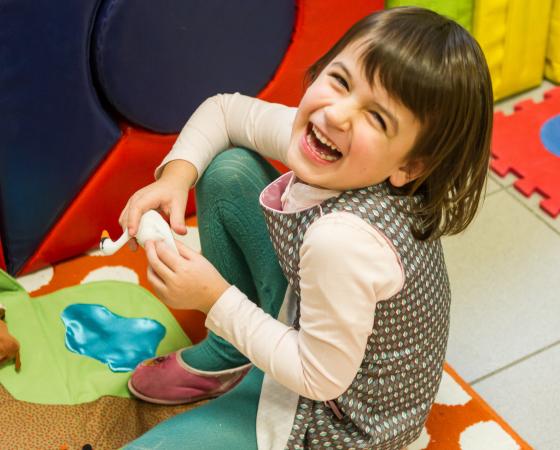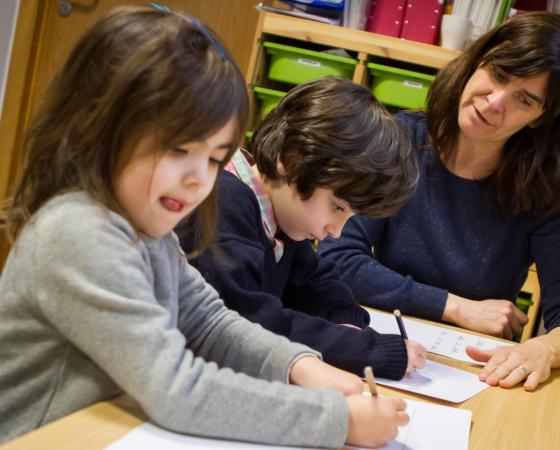ISG is a wonderful and caring school where teachers look out for the needs of students and help them to succeed in an all-round manner.
Ranjan-Kumar family from India
The fun and holistic learning environments in our Pre-Primary classes ensure that our youngest students love coming to school. Integrated topics of work from the Early Years programme of the International Primary Curriculum form the basis of all language, craft and expressive art activities. Through these fun and engaging topics, children learn about the world around them. ’Capturing a child’s curiosity’ is central to how the themes are developed. As we follow each unit for at least five weeks the children have the time and opportunity to explore and reach a deep understanding of their learning. Learning in Pre-Primary is motivating, engaging and fun, opening up a world of wonder for children where their personal interests can flourish!
Play
We believe in the importance of children’s learning through play. Pupils can, among other things, process impressions, develop imagination and creativity and develop their ability to co-operate and communicate. It is important that there is space both for the pupils’ self-initiated play and for games/play that are initiated and planned by teachers as part of the teaching.
Literacy
Rich learning experiences to develop pupils’ English language skills are at the heart of learning in Pre-Primary. Oral language activities (speaking and listening) are integrated fully into the daily programme in pre-primary in a fun and engaging way. Through listening to stories, singing, class discussions, role-playing and more, children continually develop their oral language skills. For children who are just starting to learn English, a lot of visual cues and modelling are used to develop comprehension.
In Pre-Primary the children are introduced to the letter sounds in English and letter formation following the ‘Jolly Phonics Programme’. When a child begins reading, we follow the ‘Oxford Reading Tree Programme’. The older children in Pre-primary are also helped towards early spelling and writing through different activities and the Jolly Phonics workbooks.
Numeracy
In numeracy the children learn through exploration and manipulation of material through concrete activities. The children learn to count, recognize numbers, and learn different mathematical concepts depending on their age and ability. Numeracy is fun and integrated in everyday activities- for example weighing food when baking, measuring the tails on their kite craft, counting mushroom prints in our food study, what shapes are in the house we made and so on. These kinds of activities deepen a child’s understanding. In addition to this, the older children in Pre-Primary have some more structured and formal lessons in mathematics.
Dutch
All Upper Pre-Primary pupils receive one Dutch language lesson a week. This is an initiation into the language through learning simple commands and vocabulary and simple songs and rhymes.
Sport and Swimming
All pupils have a sports lesson twice a week, and the oldest pupils in Upper Pre-Primary have a swimming lesson once or twice a month.
During sports children are challenged in multiple ways so they become confident and versatile in various physically demanding settings. They develop co-ordination, fine and gross motor skills, speed, fitness, etc. so that they can later succeed and excel in specific sports. In addition, the social aspect of sports and sportsmanship is also an essential part of the classes.
At ISG we have our own swim programme which incorporates learning how to swim and water safety. The oldest pupils in Upper Pre-Primary work towards levels 1 and 2 of the programme which include moving in the water, submerging and picking up objects, and floating on their front and back.
Music
All pupils receive a weekly music lesson from a talented specialised music teacher. Children are given lots of opportunities to sing, move to music and rhythm, and understand musical patterns and cues. The children will conduct, play, invent, improvise, compose, and follow and lead in musical games. Through learning a wide repertoire of songs, often related to our IPC topics, singing enhances children's learning but also improves their vocabulary.
Personal Values
ISG places a lot of importance on understanding, developing and celebrating personal values. Every month we focus on one of the following eight values. We talk about what they mean and try to practise them.
- Empathetic Adaptable
- Resilience Ethical
- Communicator Respect
- Thinker Collaborator
Field Trips
ISG embraces learning outside of the classroom. Classes go on field trips linked to the current IPC topic. This may include visiting a museum, gallery, observatory, farm, park or even the local bakery!
ICT
The older children in pre-primary are introduced to early programming and coding using ‘Bee-Bot’s.
A child moves to Grade 1 Primary at the start of the school year in September. A child may only start in Grade 1 if he or she is six years of age or turning six before the 31st of December. We follow the same age system for each grade as the Belgian schools.



